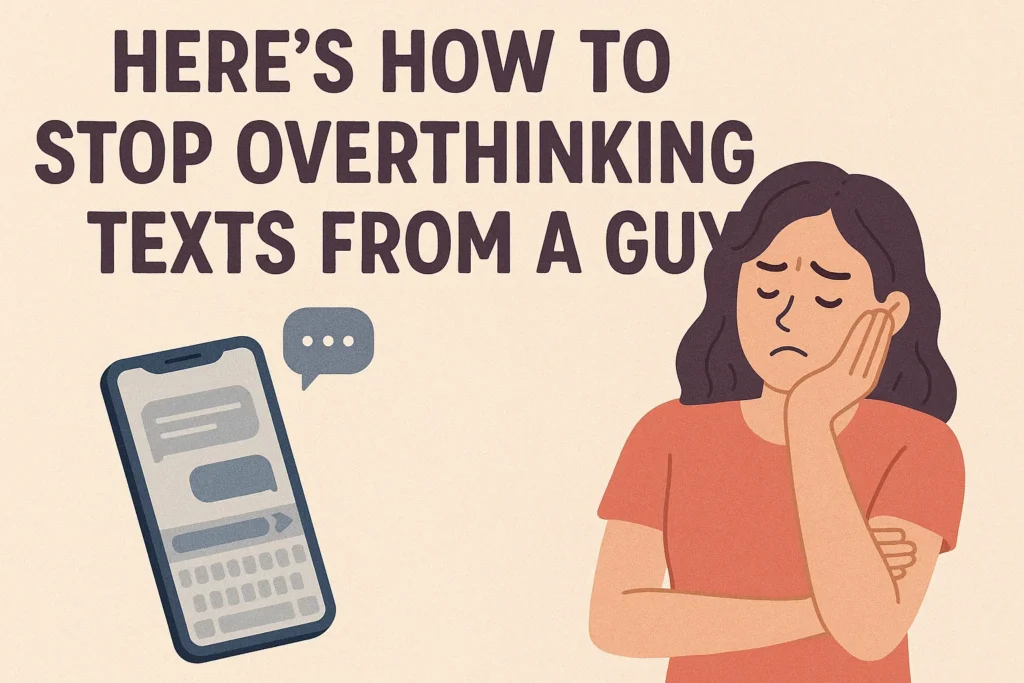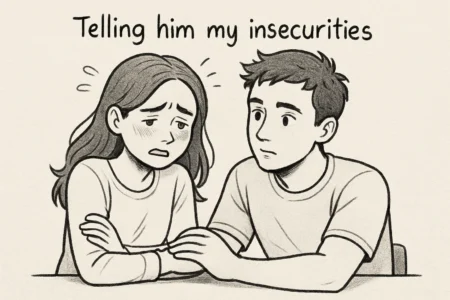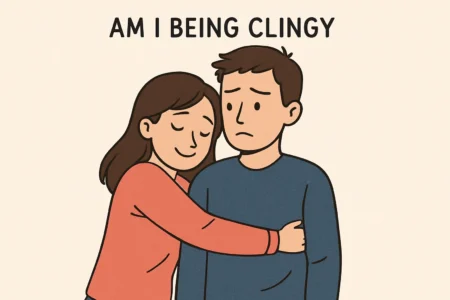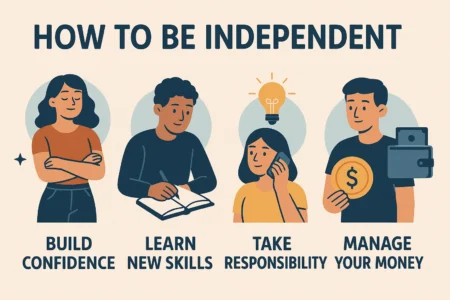It’s 10:32 PM. You know the drill. You’re staring at your phone, and your stomach is doing that awful little gymnastics routine. You sent what you thought was a perfectly casual, breezy text… forty-five minutes ago. And that cruel little rectangle of glass and light? It clearly says “Read.”
Silence.
Your brain, however, is anything but silent. It’s a full-on chaotic committee meeting where every member is screaming at once. Did I say something weird? Was the emoji too much? He’s probably with someone else. He’s lost interest. It’s over. It was definitely the emoji.
This is the cycle. It’s draining, exhausting, and it steals your joy. Trust me, I used to be the queen of this. I once torpedoed an entire three-day weekend, completely immobilized, analyzing a “Hey.” text. Just… “Hey.” No punctuation. I was convinced it meant “I’m not interested, and also, I hate you.”
(Spoiler: It didn’t.)
If you’re living in this state of digital anxiety, you know how miserable it is. You are not alone. You are not broken. You’re just human. But it’s time to get off this hamster wheel. Learning to stop overthinking texts isn’t just about dating. It’s about reclaiming your peace of mind.
And you absolutely can.
More in Self-Worth and Insecurities Category
Key Takeaways
- You’re a Storyteller (and Not in a Good Way): That whole movie you just wrote in your head where he’s bored of you? It’s fiction. 99% of the time, it’s your anxiety talking, not his reality.
- His Texts Aren’t Your Report Card: His slow reply is a reflection of him—his busyness, his bad texting habits, his stress. It is not, and never will be, a grade on your worth as a person.
- Get a Life (I Mean That in the Nicest Way): The less you have going on, the more mental real estate you have to obsess over his digital crumbs. A full, engaging life is the best defense.
- You Can’t Analyze Your Way to the Truth: Staring at your screen will never give you the answer. Real conversations will. (And sometimes, his actions are the only answer you need).
- Your Superpower Is the ‘Pause’: The magic isn’t in the reply. It’s in the moment before you spiral, the moment you choose to put the phone down and redirect your energy.
Why Do I Overanalyze His Texts So Much?
So, why do our brains turn into tiny, text-obsessed monsters? This isn’t just a silly quirk you have. It’s often a deep-seated reaction, and it’s wired into us for a few key reasons. We are social creatures. In the modern world, our primary social connection tool is this blasted phone.
Let’s be honest: texting is a terrible way to communicate anything important. It’s just words on a screen. All the real parts of human interaction—tone of voice, facial expressions, body language, that little laugh he does—are gone. You’re trying to interpret a complex emotional landscape using nothing but text. It’s like trying to guess the color of a room while blindfolded. You’re bound to get it wrong.
And when our brains are given incomplete information, they don’t just chill and wait patiently for more. Oh, no. They do what they’re built to do: they try to fill in the blanks. And what do they usually fill those blanks with? Usually, our worst-case scenarios.
Is It My Anxiety, or Is It Him?
This is the million-dollar question, right? The honest answer is that it’s almost always a cocktail of both. Many of us have an anxious attachment style. This just means we’re more prone to fearing abandonment and needing reassurance. If that’s you (it’s definitely been me), a silent phone feels like a direct, personal threat. It slams that “He’s leaving!” panic button in your brain, even when there’s no evidence.
But let’s be real. Sometimes, it is him. Some guys are just terrible texters. They see a text, think “I’ll answer that later,” and then… poof. It’s gone from their brain. On the flip side, some guys are intentionally vague. They’re breadcrumbing you. They’re playing games. They’re keeping you on the back burner.
The problem is that in the early stages, it’s almost impossible to tell the difference. Your anxiety will scream that the bad texter is a game-player, and it’ll make excuses that the game-player is just a bad texter. This is exactly why trying to find the answer in the text itself is a dead end.
Remember That Time He Texted ‘K.’?
Oh, I have a Ph.D. in this one. I’ll never forget a guy I was newly dating. I had sent him what I thought was a fun, detailed paragraph about an idea for our weekend. I was excited. I probably used a smiley face. I waited.
The reply came an hour later. One. Single. Letter.
“K.”
I spiraled. Hard. “K.” is a digital slap in the face. It’s dismissive. He’s mad. He hates the idea. He hates me. I was already mentally drafting the “it’s fine, I get it, no hard feelings” breakup text. My whole evening was ruined. I felt sick.
I finally saw him two days later and, trying to be “chill,” I didn’t bring it up. He did. “Hey,” he said, “sorry if I was short on Wednesday. I saw your text right as I was walking into a massive presentation with my boss’s boss. ‘K.’ was all I could type before I had to put my phone away. Your idea sounds amazing, by the way.”
A single letter. It held zero of the catastrophic meaning I assigned to it. It was 100% about his context and 0% about me. That was a huge, huge lesson.
What Are the Most Common Texting ‘Crimes’ We Overthink?
It’s like we all have a shared list of digital triggers that send us straight to Anxietyville. Recognizing them for what they are—common, often meaningless digital blips—is the first step to disarming them.
The Dreaded ‘… (Typing)’ Bubble That Disappears?
This one is a special kind of psychological torture. You see the bubbles. He’s replying! Your heart does a little leap. You wait, eyes glued to the screen.
And then… nothing. The bubbles vanish.
The immediate translation in our brains? “He was about to say something, but he changed his mind. He was definitely going to say something bad. He was going to reject me, or he got bored of me mid-sentence.”
The reality? He got distracted. His boss walked over. He got a call. He closed the app to look up a link to send you. He was trying to spell “beautiful” and wasn’t sure if it was “ei” or “ie.” Or, he was typing a long reply and decided, “You know what? This is a better conversation for the phone,” and made a mental note to call you later. It is almost never as dramatic as we think.
What About the ‘Read’ Receipt With No Reply?
This is the big one. The “Read” receipt is, in my opinion, one of the most toxic inventions of the 21st century. It’s a feature that provides information with zero context. Seeing that they’ve “Read” your message and haven’t replied feels like a personal rejection. It feels intentional. Cold.
But is it?
Let’s list the logical, non-panicked reasons this happens:
- He’s at work. He glanced at it (to make sure it wasn’t an emergency) and has to get back to his spreadsheet.
- He’s driving. He looked at it at a red light (bad, but we all do it) and can’t reply while moving.
- He’s with friends or family. He opened it, saw it wasn’t urgent, and put his phone down to stay present with the people he’s physically with. (This is actually a good quality, right?)
- He’s thinking. He read your question and is actually taking time to consider his answer.
- He plain old forgot. He opened it, got interrupted by his roommate, and it slipped his mind.
A “Read” receipt means one thing and one thing only: the message was opened. That is all. It does not mean “I hate you now.”
He Used to Send ‘Good Morning’ Texts… Now He Doesn’t. What Changed?
This one stings. It hurts because it feels like a loss. In the beginning, the texting was a flurry. You woke up to “Good morning, beautiful” and went to sleep with “Sweet dreams.” The constant connection was a high.
Now? It’s tapered off. The “good morning” texts are gone. Your brain screams, “He’s losing interest! The spark is dead!”
This is a classic case of confusing a change in phase with a change in feeling. The beginning of any new romance is full of “New Relationship Energy” (NRE). It’s exciting. It’s novel. The dopamine is firing on all cylinders. That level of 24/7 intensity is not sustainable. It’s not even healthy. It has to cool down for the relationship to mature into something stable and real.
Him not sending a “Good morning” text could mean he’s losing interest. Or, it could mean he’s comfortable. He’s secure. He doesn’t feel the need to “perform” constant validation because he feels the connection is established. It could also just mean… he’s not a morning person, and that initial effort was exactly that—an effort he couldn’t keep up forever.
So, How Can I Actually Stop Overthinking Texts?
Okay, we’ve diagnosed the problem. Now for the cure. This is the active, hands-on part. You have to practice these things. You can’t just read them. You have to do them.
Have You Tried… Putting Your Phone Down?
I’m dead serious. The simplest solution is often the one we never want to do. Your phone is the anxiety-delivery-device. Remove the source. When you’ve sent a text and you feel that familiar dread creeping in, put your phone in another room. Put it on “Do Not Disturb.” Turn off notifications for his specific text thread.
Go do something. Anything. Wash the dishes. Read a chapter of a book. Watch a YouTube tutorial on how to contour. Go for a walk. Call your mom and actually listen to her story about her neighbor. Organize your junk drawer.
The goal is to create a physical and mental gap between you and the “problem.” You are training your brain that you can, in fact, survive without an immediate reply. You are teaching your nervous system to self-soothe. Out of sight, out of mind. Or at least, “less on your mind.”
Are You Making Up Stories in Your Head?
This is a classic move from cognitive-behavioral therapy. When you’re in a spiral, you’re not psychic—you’re engaging in cognitive distortions called “fortune-telling” or “mind-reading.” You are certain you know what he’s thinking, and it’s always negative.
So, call your own bluff. Actively. The next time you catch yourself spiraling, grab a piece of paper or open the notes app.
- Write down the trash-fire story you are telling yourself. (e.g., “He read my text and didn’t reply because he thinks I’m annoying and is ghosting me.”)
- Now, force your logical brain to get in the game. Write down three other possible, less dramatic explanations.
- “He’s in a movie theater.”
- “His phone died right after he opened it.”
- “He’s having a stressful day at work and doesn’t have the mental energy for a conversation.”
This exercise feels silly at first. But it’s incredibly powerful. It breaks the mental loop that insists your worst-case scenario is the only possible truth. It forces your logical brain to get back in the driver’s seat.
What’s the ‘Busy Signal’ Technique?
Your brain has all this frantic energy it wants to pour into analyzing his text. You have to give that energy somewhere else to go. You need to create a “busy signal.”
My best friend and I have a code. If I’m spiraling about a guy’s text, I’ll text her “Code: ‘Hey.'” (or whatever the text was). She knows this is not her cue to jump in the rabbit hole with me. We don’t analyze it together. That’s “co-ruminating,” and it’s just as bad.
Instead, her job is to redirect me. She’ll immediately text me a funny meme, a picture of her dog, or ask me a specific, unrelated question about my work project. She doesn’t ignore my feeling, but she doesn’t indulge it, either. She provides a healthy, loving distraction.
Find your “busy signal.” It could be a friend, a specific playlist, a 10-minute yoga video, or a work task. When you feel the urge to overthink, you immediately pivot to that other activity.
Could His Texting Actually Mean Something?
This is important. I’m not here to tell you to ignore your gut. Sometimes, you’re not “overthinking”; you’re noticing. Being told “you’re just overthinking” or “it’s all in your head” when you know something is off is the worst, most invalidating feeling.
The entire point of this is to clear away the “noise” of anxiety. That way, you can hear what your real intuition is telling you. So yes, sometimes his texting patterns are the message.
How Do I Tell the Difference Between My Anxiety and a Real Red Flag?
Here is the most important rule of all: Look for patterns, not isolated incidents.
Anxiety freaks out over incidents.
- A single “K.”
- One night of slow replies.
- One “read” text left unanswered for three hours.
Intuition picks up on patterns.
- He consistently only gives one-word answers, even when you try to engage him.
- He consistently disappears for days at a time and then pops back up like nothing happened.
- He consistently only texts you after 11 PM.
- He consistently avoids making future plans.
- He consistently leaves you on “read” for 24 hours or more.
See the difference? One is a blip. The other is a behavior. Anxiety is a “What if?!” Intuition is a quiet, steady, “Oh… I see.” Your anxiety is loud, frantic, and panicky. Your intuition is usually a quiet, steady, sinking feeling. To stop overthinking texts, you have to learn to listen to the quiet voice, not the loud one.
What Are Some Telltale Texting Patterns to Watch For?
If you’ve calmed your anxiety and you’re still seeing these patterns, it’s time to pay attention. This isn’t “overthinking”—this is “data collection.”
- Breadcrumbing: This is the guy who sends just enough to keep you interested. He’ll text you “thinking of you” but will be “too busy” when you suggest an actual date. He’s keeping you on the hook with minimal effort.
- The Vague-booker: You ask him what he’s up to. “Just chillin.” You ask him how his week was. “Busy.” He never offers details. He never asks you questions about your life. The conversation is a one-way street, and you’re the only one driving.
- The Late-Night-Only Texter: “U up?” “Hey stranger…” at 1 AM. This is not a man who is interested in your mind, your day, or your future. This is a booty call. If that’s what you want, great. But if you’re overthinking why he doesn’t want to get brunch, this is your answer.
- The Hot-and-Cold Cycle: He texts you non-stop for two days, making you feel like the most important person in the world. Then… poof. He’s cold, distant, and barely replies for a week. This is often a sign of game-playing, ambiguity, or him dating multiple people. It’s a pattern designed to keep you off-balance, and it’s exhausting.
What’s a Healthier Way to Handle Texting in a Relationship?
The goal isn’t just to stop the bad habits; it’s to build good ones. This is about creating a new, healthier relationship with your phone and, by extension, with the people you’re dating.
Why Don’t We Just… Ask?
I know, it’s a wild idea. After a certain point, if something is really bothering you (and it’s part of a pattern), you can just… use your words.
This is not a green light to send a frantic, 12-paragraph text: “I’ve noticed you’ve been taking 3 hours longer to reply on average than you did last week, and you used the ‘thumbs up’ emoji instead of the ‘smiley’ one, does this mean you’re mad at me???”
It does mean waiting for an appropriate time (maybe when you’re in person or on the phone) and saying it calmly. “Hey, I’ve been feeling a little disconnected lately. Everything okay with you?” Or, “I’m more of a phone-call person. Would you be open to talking on the phone more instead of texting?”
Clear, calm communication is the antidote to anxious analysis. Either he’ll give you a clear answer, or his reaction to your calm question will be all the answer you need.
Have You Heard of ‘Matching Energy’?
This isn’t about playing games. Let me say that again: This is NOT about “If he takes 1 hour, I’ll take 1 hour and 5 minutes.” That’s just more anxiety disguised as strategy.
“Matching energy” is about self-preservation. It’s about not over-investing where it’s not being reciprocated. It’s about not pouring your five-star effort into a one-star situation. If you’re consistently sending thoughtful, engaging paragraphs and he’s consistently replying with “lol,” “nice,” or “K,” you need to stop sending paragraphs.
Pull back. Not as a punishment, but as a re-balancing. Send shorter texts. Get busy with your own stuff. See if he steps up to fill the space. If he does, great! If he doesn’t, you’ve just saved yourself a lot of future energy.
Could You Benefit from Setting Your Own Texting Boundaries?
This is a big one. Part of why we get so anxious is because we are always available. We reply in 2.5 seconds. We’ve trained our brains, and his, that a text is an emergency that must be handled now.
You don’t have to live like a 911 operator.
Put your phone on “Do Not Disturb” from 9 PM every night. Leave your phone in your bag when you’re out to dinner with friends. Go to the gym and leave it in the locker. This does two things. First, it trains your own brain that the world does not end if a text isn’t answered instantly. Second, it subconsciously communicates to him that you are a person with a full, important life of your own. You are not just sitting by the phone waiting for him. As research from institutions like the University of California, Irvine shows, constant interruptions (like text notifications) dramatically increase stress. Protecting your focus is protecting your peace.
What Happens When I Stop Making His Texts My Main Focus?
This is the beautiful part. This is the “after” picture. When you successfully implement these strategies, your entire life changes, not just your dating life.
You Get Your Life Back, That’s What.
The moment I truly, truly stopped analyzing and started living was a game-changer. I realized how many hours of my life I had donated to staring at a screen, waiting. What could I have done with that time?
So I started doing it. I went to the gym. I read that stack of books on my nightstand. I signed up for a pottery class (I was terrible, but it was fun). I made plans with my friends and was present with them, my phone zipped in my purse.
And you know what? My phone became… just a phone. It wasn’t a magic 8-ball for my self-worth. It wasn’t a barometer for his love. It was a tool. A tool I used to make plans, share a funny meme, and then put down so I could go back to my awesome, fulfilling life. It was so, so freeing.
How Does This Actually Improve the Relationship (Or End It)?
Here’s the magic trick. When you’re less anxious, you’re more attractive. You’re more you. The real, fun, confident, interesting you isn’t the one who’s biting her nails staring at a “Read” receipt. The real you is the one who’s laughing with her friends, killing it at work, or passionate about her hobbies (even the one you’re terrible at).
When you bring that energy to your interactions, one of two things happens:
- He steps up. He sees this vibrant, confident woman who has a full life and doesn’t need him, but chooses to make time for him. That’s compelling. He’ll start to put in more effort because he wants to be a part of that. Your confidence inspires his investment.
- You realize he’s not for you. You’ll be so busy living your life that his “K.” texts or his 2-day silences will stop looking like a tragedy and start looking like an annoyance. You’ll think, “Ugh, I’m too busy for this nonsense.” You’ll outgrow him. You’ll stop overthinking texts from him because, frankly, you’ve stopped thinking about him at all.
And that, right there, is the win.
Your Phone Is Not Your Relationship
A text is just a text. It’s a collection of pixels. It is not a binding contract of his affection. It is not a real-time measurement of your worth.
Real connections are built in the in-between. They’re built in person, over shared jokes and real eye contact. They’re built on the phone, hearing the actual sound of his laugh. They’re built through shared experiences, consistency, and seeing how he shows up for you in the real, non-digital world.
His job is to be clear with his intentions. Your job is to stop trying to find them in a three-word text.
You deserve a love that is clear, not one you have to decode like it’s a spy novel. So, the next time your thumb hovers, ready to type “Are you mad at me?”… stop. Put the phone down.
Go be amazing. He’ll catch up. Or, someone better will.
FAQ
What should I do when I see the ‘typing’ bubble disappear?
Remember that the ‘typing’ bubble vanishing often means a distraction or interruption on his end, not necessarily a negative sign, so resist the urge to assume the worst and trust the context rather than your anxiety.
How do I know if his silence means something serious?
Look for patterns rather than isolated incidents; consistent behaviors like repeated slow replies, avoiding future plans, or prolonged ‘read’ receipts are more indicative of genuine issues than occasional brief silence.
What is the healthiest way to handle texting in a relationship?
The healthiest approach is to communicate openly and calmly about your feelings, set boundaries around your phone use, match his level of effort without overinvesting, and focus on building real-world connection instead of overanalyzing digital messages.




